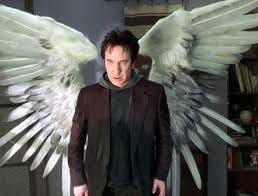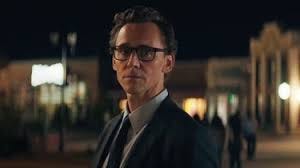The half-century since the debut of the game-changing blockbuster Jaws has seen the release of any number of films trying to ape its incredible success with narratives involving sharks chomping on people foolish enough to get too close to them. A few have been impressive (particularly the fairly spectacular The Shallows) and many of them have been quite terrible (so much so that even the lesser installments of the Sharknado franchise are somehow not quite the bottom of that particular barrel) but I think that Dangerous Animals might be the first where the shark on display is not the deadliest and most fearsome creature on display. That honor goes to Tucker (Jai Courtney), a beefy degenerate who gets his kicks out of luring unsuspecting people onto his garish orange boat in order to do some cage diving in the waters off of Australia, only to end up feeding them to the sharks via elaborate rituals that he then videotapes in order to relive the experience later. His latest potential subject is Zephyr (Hassie Harrison), a loner American surfer who has come to ride the waves and whom he drugs and locks up on his ship with another young woman being held prisoner, Heather (Ella Newton). After discovering what is in store, Zephyr struggles to figure out a way to escape her predicament without being turned into shark bait while Moses (Josh Heuston), the amiable real estate agent she had a one-night stand with, goes about trying to figure out where she has gone.
The basic premise of Nick Lepard’s screenplay—essentially taking the infamously ugly Australian tourist slaughter fest Wolf Creek and resetting it on a boat—is, to put it mildly, fairly ridiculous and while director Sean Byrne (whose previous efforts include the cult favorites The Loved Ones and The Devil’s Candy) tries to show that he is in on the joke by making an overt Jaws reference right at the top, he never quite figures out how to make the proceedings as tense or as gripping as he clearly wants it to be—it takes a long time for the central story to come into focus and too much of the remainder consists of an increasingly repetitive cat-and-mouse game between Zephyr and Tucker—who at one point delivers the inevitable monologue about how alike the two of them really are—occasionally punctuated by the unexpected arrivals of visitors who will help bump up the body count. And yet, as silly sharksploitation epics go, this film is somewhat more tolerable than most. Although her character is thinly drawn and her resemblance to Jennifer Lawrence may be severely distracting at times, Harrison makes for a reasonably spunky and resourceful heroine as she desperately tries to avoid such horrors as killer sharks, psychopaths and Vegemite sandwiches. As for Courtney, who has mostly been a non-entity in such forgettable franchise films as A Good Day to Die Hard, Terminator Genisys and the Divergent saga, he actually proves to be the best thing the film has to offer. Beefier than we have seen him before, he is clearly having a ball playing the bad guy here and gives both the material and the film as a whole a certain jolt whenever he pops up on the screen. He may not be enough to make Dangerous Animals into a must-see entry in the annals of shark cinema but to whatever degree that it does work—and I assure you that you have seen worse such movies—is largely on the basis of his cheerfully wacko efforts
.Originally released in 1999 to good reviews, decent box office and no small amount of controversy, Kevin Smith’s Dogma has been in distribution limbo for several years now due to rights issues involving Harvey and Bob Weinstein. At long last, those issues have been resolved with Smith personally regaining the rights and now it is returning to theaters to celebrate its just-past-25th-anniversary. For those who don’t recall, this was Smith’s deeply irreverent comedy-fantasy centered around two fallen angels (Matt Damon and Ben Affleck) who, following a lifetime banishment in the hellscape of Wisconsin, set off on a trip to New Jersey to exploit a loophole in Catholic dogma that would allow them re-entry into Heaven. Alas, if this happened, it would prove that God is not omnipotent and cause the destruction of the universe, so the two must be stopped. However, the person chosen for this task by the seraph Metatron (Alan Rickman) for this task is Bethany (Linda Fiorentino), a depressed abortion clinic counselor who has no religious ties to speak of, as far as she knows. As she goes about her quest to save humanity, she is joined by unlikely prophets Jay and Silent Bob (Jason Mewes and Smith), the heretofore unknown 13th apostle Rufus (Chris Rock) and muse-turned-stripper Serendipity (Salma Hayek) while fighting off obstacles of varying degrees of grossness sent by the demon Azrael (Jason Lee) and debating the teachings of the Catholic church in ways both sacred and very profane (starting with the casting of George Carlin as a cardinal, not to mention the late-inning appearance of Alanis Morissette in a role that will surprise you).
Back when it first came out, I liked Dogma a lot—although Smith’s skills behind the camera may not have been 100% up to the task of bringing such an ambitious narrative to life, the screenplay was a mostly inspired blend of wild humor and genuine inquiry into questions of religious faith conveyed through whip-smart (and often smart-ass) dialogue. Although some of the jokes and conceits may not have aged particularly well over the past quarter-century (not to mention some, primarily the arrival of a demon made entirely out of human shit, that didn’t work very well back then), most of the stuff that did work then has managed to stand the test of time. With the surprising exception of Fiorentino, who always seems just a little too removed from the proceedings at times, the diverse cast that Smith assembled here has a lot of fun with the material as they spark off of each other in intriguing ways (with Damon and the late, great Rickman standing out in particular). Moreover, while I don’t imagine that this is a film that will be screened in most Sunday schools, it does present a take on organized religion and the myriad ways in which it seems to contradict itself that is more curious and nuanced than most of the faith-based films to emerge in recent years. Most significantly, this reissue of Dogma serves as a reminder of a time when Kevin Smith was a filmmaker with genuine vision and ambition before the laziness of his recent efforts—perhaps having it return after being unavailable for so long will remind him of those days and inspire him to take more chances in his future efforts
.While The Life of Chuck may indeed be based on a novella by Stephen King (first published in his 2020 best-seller If It Bleeds), it eschews the kind of gut-crunching horror that he is synonymous with to tell a gentler and more life-affirming narrative along the lines of such works as “The Body” (filmed as Stand By Me) and The Shawshank Redemption. Told in reverse chronology in three separate sections, the film observes the life of the seemingly ordinary accountant Charles “Chuck” Krantz and the impact he has had on the world. In the first, set during what appears to be the final days of humanity amidst a seemingly endless array of environmental and technological disasters, a former couple (Chiwetel Ejiofor and Karen Gillian) face the end of everything while trying to figure out the meaning behind the mysterious glut of billboards and commercials thanking Chuck for 39 years of service. In the second section, we see Chuck (Tom Hiddleston) during an odd incident in a town square where he is inspired by the sounds of a busking drummer (The Pocket Queen) to burst out into a spontaneous and elaborate dance that also encompasses the recently jilted Janice (Annalise Basso). In the last segment, we see Chuck as a child (played alternately by Benjamin Pajak and Jacob Tremblay) growing up, following a tragedy, with his grandparents, Sarah (Mia Sara) and Albie (Mark Hamill)—the former instills in him a love of dance while the latter tries to steer him towards an interest in mathematics and away from the locked door to an attic and whatever horror may reside beyond it.
On the page, the story wasn’t particularly mind-blowing—it was far more interesting as a formal experiment than as a narrative—but it had a certain charm that reminded readers that King’s talents as a writer could also encompass the kind of gentle fantasies that Ray Bradbury used to create once upon a time. On the screen, however, that charm has curdled to an almost astonishing degree and the results are fairly deadly throughout. Having previously helmed adaptations of King’s Gerald’s Game and Doctor Sleep, writer-director Mike Flanagan might seem to be a good choice for this project but he proves to be all thumbs with the material—instead of handling it with the kind of delicacy required to make it work without becoming too cloying, he takes a hard-sell approach to its banal greeting-card-level observations of the preciousness of life (which are not improved by a narration supplied by Nick Offerman that is more disingenuous that thoughtful) that is so overbearing that it practically leaps off the screen, grabs you by the lapels and screams “Laugh! Cry! Contemplate the joys and mysteries of human existence!” Of the three sections, the last one is the only one that comes close to working—it has a couple of amusingly sweet-natured moments and it is nice to see Mia Sara on the screen again after a long absence—but the integration of supernatural elements into the mix doesn’t quite work and it all seems to be building to some grand and powerful statement on life, death and everything in between that never quite arrives. At its core, The Life of Chuck has no real ambitions other than being a big crowd-pleaser of a movie that goes for easy emotions and refuses to challenge viewers in any meaningful way. I suppose that on this level, it does succeed (it won the People’s Choice Award at the Toronto Film Festival, the same prize given to such deathless classics as Green Book, Jojo Rabbit and The Fablemans and there are times when it feels like all three of them rolled into one) but anyone looking for something more than two solid hours of shallow uplift delivered with all the subtlety of a mallet to the face is likely to come away from feeling more annoyed than enlightened.






